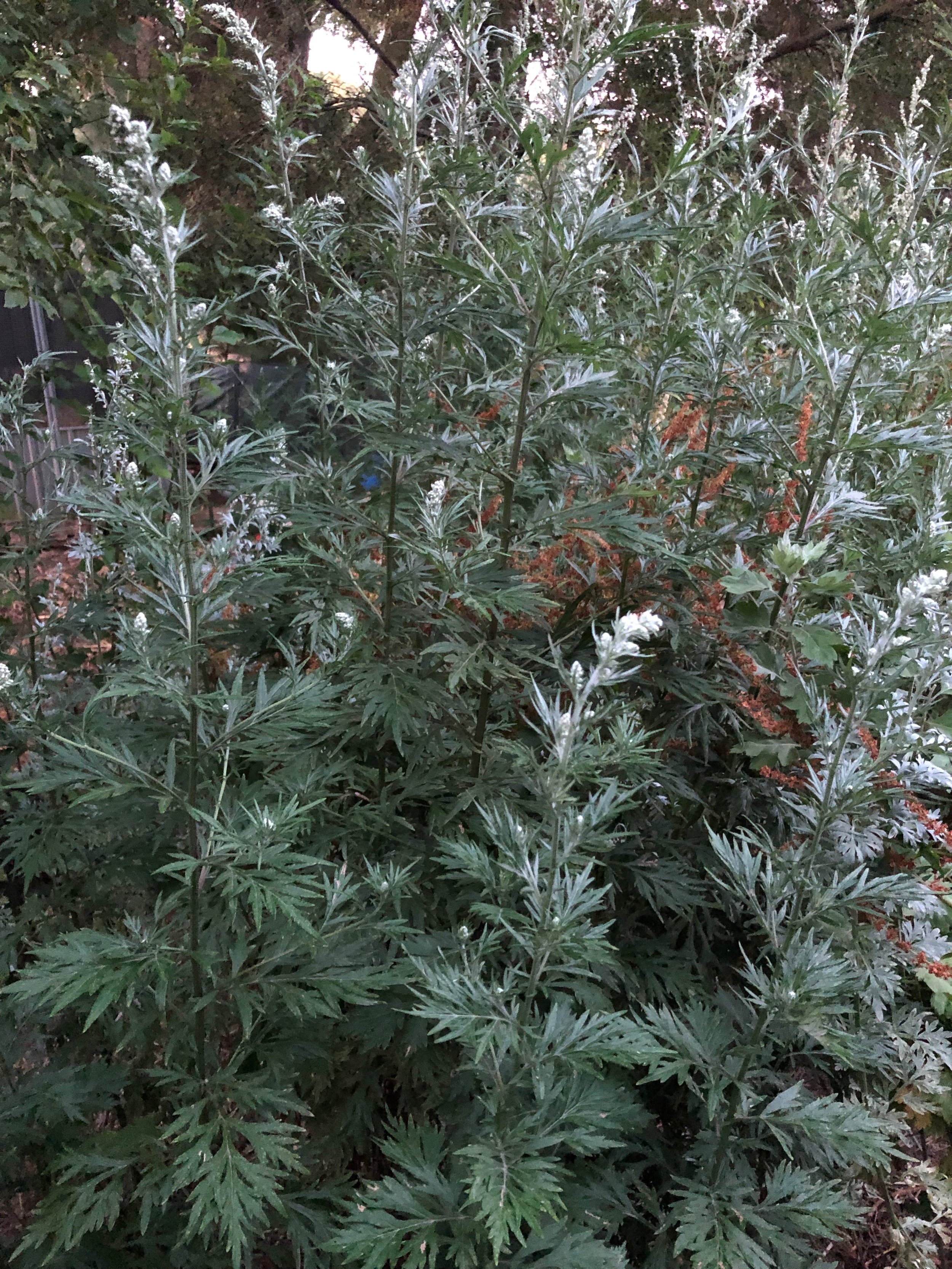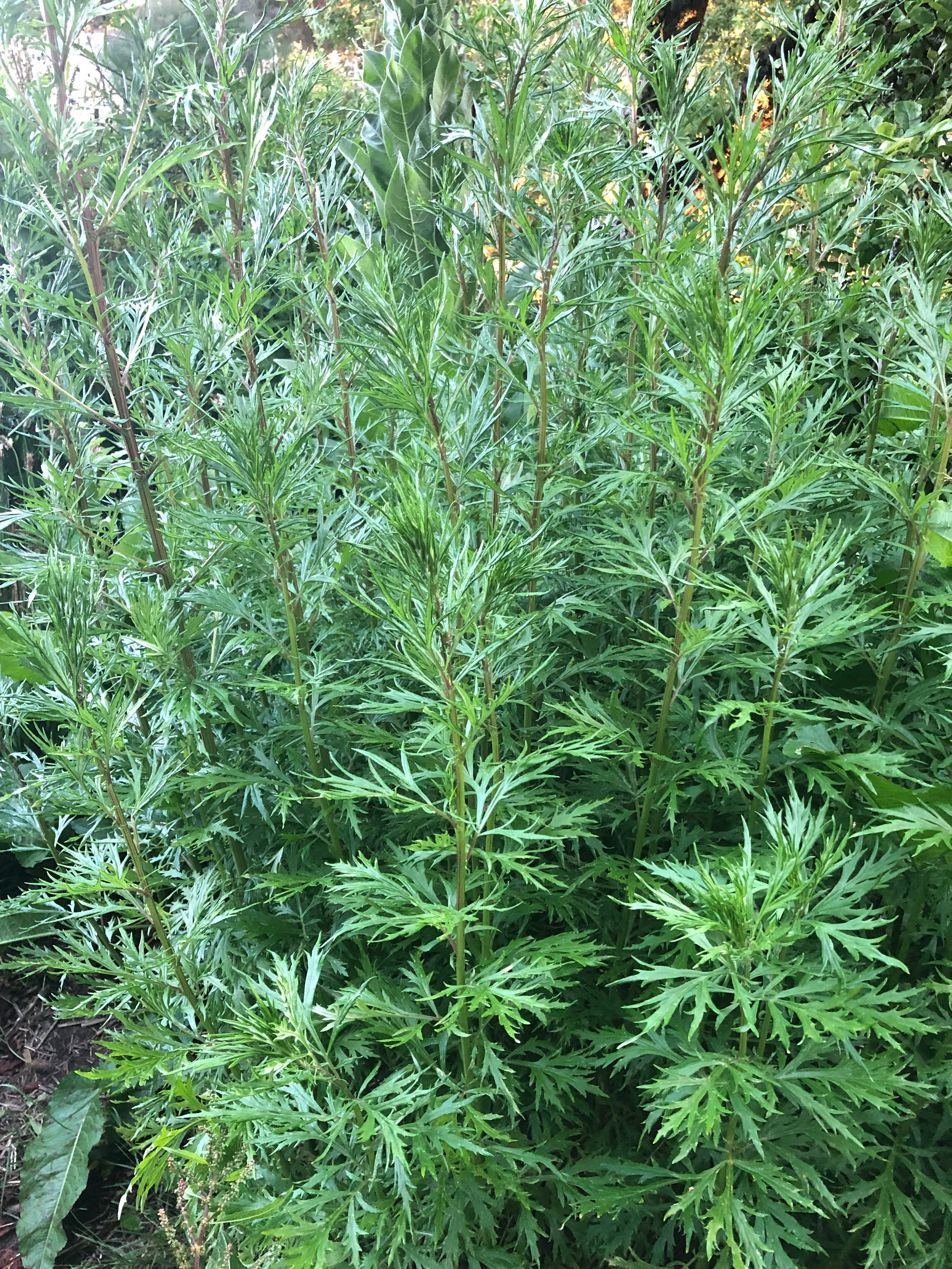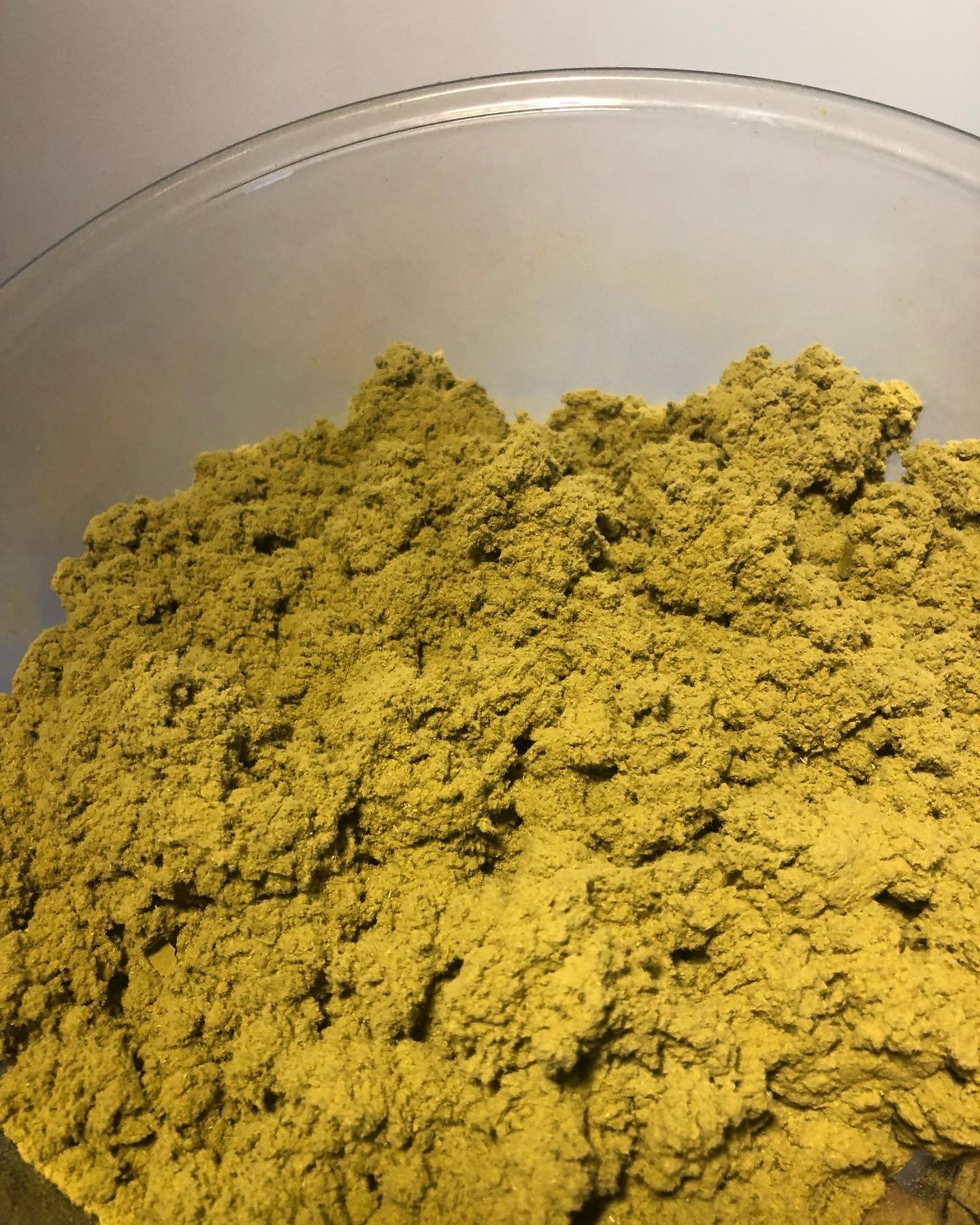 Image 1 of 4
Image 1 of 4

 Image 2 of 4
Image 2 of 4

 Image 3 of 4
Image 3 of 4

 Image 4 of 4
Image 4 of 4





Mugwort Seeds
Mugwort (Artemisia vulgaris)
Description:
Mugwort is a herbaceous perennial plant, belonging to the Asteraceae family, that is known for its distinctively aromatic leaves and historical uses in traditional medicine and folklore. It is native to Europe, Asia and North Africa, having naturalised in many parts of the world due to its invasive nature. Mugwort is a hardy plant that can grow up to 3 to 6 feet (90 to 180cm) in height, sometimes taller, although is distinguishable from its cousin, tree mugwort (Artemisia verlotiorum). It features deeply lobed, dark green leaves that have a silvery underside. The leaves are highly aromatic when crushed, emitting a strong, herbal scent. Mugwort produces clusters of small, inconspicuous flowers that are greenish-yellow to red in colour. It spreads through underground rhizomes and can form dense colonies that can take over a space relatively fast. Mugwort has a long history of use in various cultures for its medicinal and ceremonial purposes.
Growing Conditions:
Climate: adaptable to a wide range of climates and can thrive in temperate to subarctic regions.
Position: full sun to partial shade but can tolerate a variety of light conditions; performs best with at least 4 to 6 hours of direct sunlight per day.
Soil: various soil types incl. sandy, loamy, or clay soils but prefers moderately fertile, well-draining soil; ideal soil pH should be slightly acidic to neutral (around 6.0 to 7.0).
Water: low - moderate water needs; relatively drought-tolerant once established.
Spacing: space the plants approximately 1 to 2 feet (30 to 60cm) apart.
Propagation: sow the seeds directly onto the garden bed or seed flats/pots surface in spring or autumn and tamp securely; divide the roots of mature plants in early spring or autumn by carefully separating the root clumps and replanting them; or take cuttings of the woody stem in spring or early summer.
Harvest:
Leaves: harvest the leaves when they are fully grown and at their peak freshness. This is typically in the summer months before the plant flowers. Choose leaves that are healthy and vibrant.
Flowers: harvest the flowers when they are fully open and at their peak bloom. This is typically in late summer or early autumn. For the purpose of beer making, the whole flowering plant is harvested and dried.
~100 seeds per pack
Mugwort (Artemisia vulgaris)
Description:
Mugwort is a herbaceous perennial plant, belonging to the Asteraceae family, that is known for its distinctively aromatic leaves and historical uses in traditional medicine and folklore. It is native to Europe, Asia and North Africa, having naturalised in many parts of the world due to its invasive nature. Mugwort is a hardy plant that can grow up to 3 to 6 feet (90 to 180cm) in height, sometimes taller, although is distinguishable from its cousin, tree mugwort (Artemisia verlotiorum). It features deeply lobed, dark green leaves that have a silvery underside. The leaves are highly aromatic when crushed, emitting a strong, herbal scent. Mugwort produces clusters of small, inconspicuous flowers that are greenish-yellow to red in colour. It spreads through underground rhizomes and can form dense colonies that can take over a space relatively fast. Mugwort has a long history of use in various cultures for its medicinal and ceremonial purposes.
Growing Conditions:
Climate: adaptable to a wide range of climates and can thrive in temperate to subarctic regions.
Position: full sun to partial shade but can tolerate a variety of light conditions; performs best with at least 4 to 6 hours of direct sunlight per day.
Soil: various soil types incl. sandy, loamy, or clay soils but prefers moderately fertile, well-draining soil; ideal soil pH should be slightly acidic to neutral (around 6.0 to 7.0).
Water: low - moderate water needs; relatively drought-tolerant once established.
Spacing: space the plants approximately 1 to 2 feet (30 to 60cm) apart.
Propagation: sow the seeds directly onto the garden bed or seed flats/pots surface in spring or autumn and tamp securely; divide the roots of mature plants in early spring or autumn by carefully separating the root clumps and replanting them; or take cuttings of the woody stem in spring or early summer.
Harvest:
Leaves: harvest the leaves when they are fully grown and at their peak freshness. This is typically in the summer months before the plant flowers. Choose leaves that are healthy and vibrant.
Flowers: harvest the flowers when they are fully open and at their peak bloom. This is typically in late summer or early autumn. For the purpose of beer making, the whole flowering plant is harvested and dried.
~100 seeds per pack
Mugwort (Artemisia vulgaris)
Description:
Mugwort is a herbaceous perennial plant, belonging to the Asteraceae family, that is known for its distinctively aromatic leaves and historical uses in traditional medicine and folklore. It is native to Europe, Asia and North Africa, having naturalised in many parts of the world due to its invasive nature. Mugwort is a hardy plant that can grow up to 3 to 6 feet (90 to 180cm) in height, sometimes taller, although is distinguishable from its cousin, tree mugwort (Artemisia verlotiorum). It features deeply lobed, dark green leaves that have a silvery underside. The leaves are highly aromatic when crushed, emitting a strong, herbal scent. Mugwort produces clusters of small, inconspicuous flowers that are greenish-yellow to red in colour. It spreads through underground rhizomes and can form dense colonies that can take over a space relatively fast. Mugwort has a long history of use in various cultures for its medicinal and ceremonial purposes.
Growing Conditions:
Climate: adaptable to a wide range of climates and can thrive in temperate to subarctic regions.
Position: full sun to partial shade but can tolerate a variety of light conditions; performs best with at least 4 to 6 hours of direct sunlight per day.
Soil: various soil types incl. sandy, loamy, or clay soils but prefers moderately fertile, well-draining soil; ideal soil pH should be slightly acidic to neutral (around 6.0 to 7.0).
Water: low - moderate water needs; relatively drought-tolerant once established.
Spacing: space the plants approximately 1 to 2 feet (30 to 60cm) apart.
Propagation: sow the seeds directly onto the garden bed or seed flats/pots surface in spring or autumn and tamp securely; divide the roots of mature plants in early spring or autumn by carefully separating the root clumps and replanting them; or take cuttings of the woody stem in spring or early summer.
Harvest:
Leaves: harvest the leaves when they are fully grown and at their peak freshness. This is typically in the summer months before the plant flowers. Choose leaves that are healthy and vibrant.
Flowers: harvest the flowers when they are fully open and at their peak bloom. This is typically in late summer or early autumn. For the purpose of beer making, the whole flowering plant is harvested and dried.
~100 seeds per pack